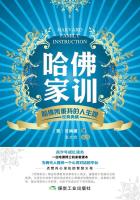THE FIRE: AN INTERLUDE
On the morning of March 17, 1914, College Hall, the oldest and largest building on the Wellesley campus, was destroyed by fire.
No one knows how the fire originated; no one knows who first discovered it. Several people, in the upper part of the house, seem to have been awakened at about the same time by the smoke, and all acted with clear-headed promptness. The night was thick with fog, and the little wind "that heralds the dawn" was not strong enough to disperse the heavy vapors, else havoc indeed might have been wrought throughout the campus and the sleeping village.
At about half past four o'clock, two students at the west end of College Hall, on the fourth floor, were awakened and saw a fiery glow reflected in their transom. Getting up to investigate, they found the fire burning in the zoological laboratory across the corridor, and one of them immediately set out to warn Miss Tufts, the registrar, and Miss Davis, the Director of the Halls of Residence, both of whom lived in the building; the other girl hurried off to find the indoor watchman. At the same time, a third girl rang the great Japanese bell in the third floor center.
In less than ten minutes after this, every student was out of the building.
The story of that brief ten minutes is packed with self-control and selflessness; trained muscles and minds and souls responded to the emergency with an automatic efficiency well-nigh unbelievable.
Miss Tufts sent the alarm to the president, and then went to the rooms of the faculty on the third floor and to the officers of the Domestic Department on the second floor. Miss Davis set a girl to ringing the fast-fire alarm. And down the four long wooden staircases the girls in kimonos and greatcoats came trooping, each one on the staircase she had been drilled to use, after she had left her room with its light burning and its corridor door shut.
In the first floor center the fire lieutenants called the roll of the fire squads, and reported to Miss Davis, who, to make assurance doubly sure, had the roll called a second time. No one said the word "fire"--this would have been against the rules of the drill.
For a brief space there was no sound but "the ominous one of falling heavy brands." When Miss Davis gave the order to go out, the students walked quietly across the center, with embers and sparks falling about them, and went out on the north side through the two long windows at the sides of the front door.
And all this in ten minutes!
Meanwhile, Professor Calkins, who does not live at the college but had happened to spend the night in the Psychology office on the fifth floor, had been one of the earliest to awake, had wakened other members of the faculty and helped Professor Case and her wheel-chair to the first floor, and also had sent a man with an ax to break in Professor Irvine's door, which was locked. As it happened, Professor Irvine was spending the night in Cambridge, and her room was not occupied. Most of the members of the faculty seem to have come out of the building as soon as the students did, but two or three, in the east end away from the fire, lingered to save a very few of their smaller possessions.
The students, once out, were not allowed to re-enter the building, and they did not attempt to disobey, but formed a long fire line which was soon lengthened by girls from other dormitories and extended from the front of College Hall to the library. Very few things above the first floor were saved, but many books, pictures, and papers went down this long line of students to find temporary shelter in the basement of the library. Associate Professor Shackford, who wrote the account of the fire in the College News, from which these details are taken, tells us how Miss Pendleton, patrolling this busy fire line and questioning the half-clad workers, was met with the immediate response, even from those who were still barefooted, "l'm perfectly comfortable, Miss Pendleton", "l'm perfectly all right, Miss Pendleton." Miss Shackford adds:
"At about five o'clock, a person coming from the hill saw College Hall burning between the dining-room and Center, apparently from the third floor up to the roof, in high, clear flames with very little smoke. Suddenly the whole top seemed to catch fire at once, and the blaze rushed downward and upward, leaping in the dull gray atmosphere of a foggy morning. With a terrific crash the roof fell in, and soon every window in the front of College Hall was filled with roaring flames, surging toward the east, framed in the dark red brick wall which served to accentuate the lurid glow that had seized and held a building almost one eighth of a mile long. The roar of devastating fury, the crackle of brands, the smell of burning wood and melting iron, filled the air, but almost no sound came from the human beings who saw the irrepressible blaze consume everything but the brick walls.
"The old library and the chapel were soon filled with great billows of flame, which, finding more space for action, made a spectacle of majestic but awful splendor. Eddies of fire crept along the black-walnut bookcases, and all that dark framework of our beloved old library. By great strides the blaze advanced, until innumerable curling, writhing flames were rioting all through a spot always hushed 'in the quiet and still air of delightful studies.' The fire raged across the walls, in and around the sides and the beautiful curving tops of the windows that for so many springs and summers had framed spaces of green grass on which fitful shadows had fallen, to be dreamed over by generations of students.















